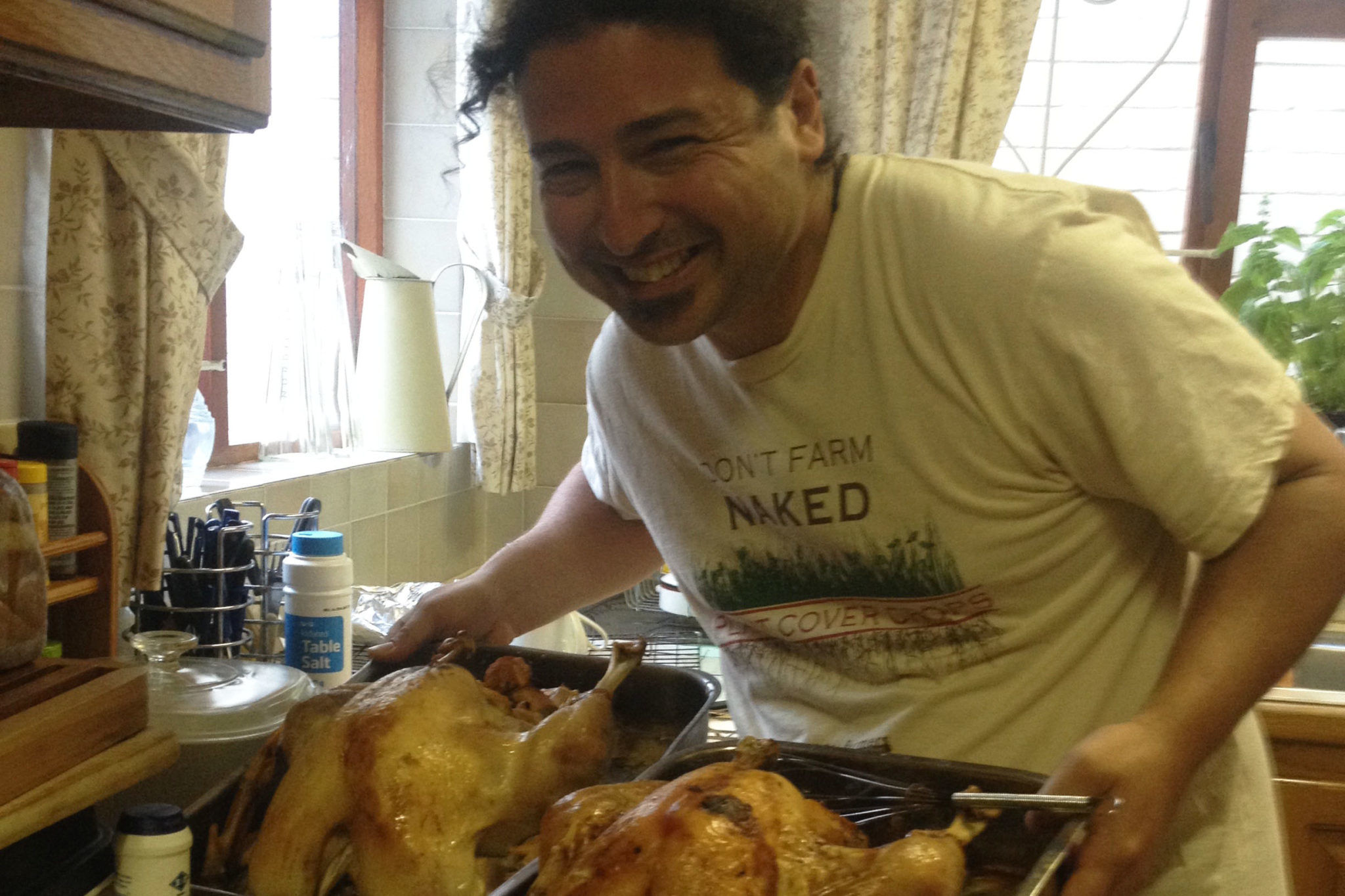How to observe the upcoming holiday in a small-scale, local and sustainable manner.
For those of us with a Jewish farm-to-table food ethic, the Thanksgiving feast represents a tremendous opportunity and significant challenge. Here’s a holiday fraught with hypocrisy and huge questions of ecological impact, yet it presents an opportunity to connect with our local food shed and raises the sparks of locally produced, seasonally appropriate goodness.
How can we offer our dear ones a feast that’s both delicious but also truly “kosher” or “fit to eat” for our palate, bodies and the plants, animals, people and soils that produced the ingredients?
The Talmud says (Talmud Bavli, Chagigah 27a) in the absence of the temple altar in Jerusalem, the family table becomes the altar and path to atonement. This year, Thanksgiving falls in the Jewish month of Kislev, the month in which we celebrate Chanukah, commemorating the rededication of the temple.
In our day and age, I invite you to consider rededicating the altar of your dinner table, specifically your Thanksgiving dinner table. For me, the farm-to-table movement means taking my food dollars out of the industrial food system and diverting them to small-scale, local, sustainable producers. It means sourcing ingredients that are local and in-season, and preparing them in healthy, creative and simple ways.

If the Thanksgiving turkey, traditionally roasted and served whole, is to be a stand-in for the ancient Judaic burned offering, we all must ask ourselves, is my holiday offering an industrially cultivated “Frankenbird” with a stuffing of antibiotics and growth hormones? What about Aunt Sally’s ubiquitous green bean casserole? Is it served on a bed of fossil fuels and garnished with labor exploitation, with a pesticide drizzle?
Thanksgiving can serve as a powerful opportunity to redeem the sins of our elders and bring more health and abundance to the world. What better place to make a stand for pure food, recipes and preparations that take more time and effort because they’re worth it?
While industrial turkey is an example of some of the worst practices our industrial food system has cooked up, pastured, heritage-breed and locally raised turkeys can offer us some great alternatives. Part of my Thanksgiving tradition is to drive up to Pennsylvania each year to help kill free-range turkeys with one of my farm mentors in return for one of his beautiful birds. It’s true that good meat is expensive, and as such speaks to complex questions of privilege and accessibility.
But what can I say? I think it’s worth it.
For the kosher keepers, check out Grow and Behold Foods (growandbehold.com) for pastured glatt kosher meats; for kosher-style, connect with a local farmer at the farmers market or search online for pastured or heritage-breed birds. Having spent a chunk of change on a special bird, you will want to get the most out of it. After roasting it for the big night, remember to boil the carcass for rich turkey stock and use the leftover meat in a potpie.

In terms of produce consider a hearty greens dish like kale sautéed in coconut oil and topped with garlic, onions and pumpkin seeds. Also, a spinach salad with purple onions and sliced apples is a true taste of late fall.
We also have great storage crops to utilize. Potatoes, sweet potatoes and winter squash were all harvested in the late summer and stored to last the winter. So those candied yams, mashed potatoes and stuffed squash all are in keeping with our seasonal integrity. Likewise, carrots, beets, turnips, parsnips and rutabagas. Consider a hearty roots dish this year like bourbon-honey glazed carrots or roasted balsamic beets.
Cabbage is still around, and a fresh batch of sauerkraut will add zing, crunch and vitamin C to the spread. Apples and pears have been harvested recently and are prime for pies and other baked treats.
Of course, it wouldn’t be Thanksgiving without pumpkin pie and cranberry. Luckily, both of these crops grow locally; a backyard pumpkin patch is a fun and easy gardening project for the kids, and cranberries (grown in the right conditions) can yield brilliant red gems right outside your door.
So how can we prepare a Thanksgiving feast worthy of serving as an altar? It’s all about the sourcing and consideration of ingredients — where they came from and how they were produced. This year, let the Thanksgiving feast remind us that the foods we eat and the way they are produced really do matter from a culinary, environmental, ethical local economic and Jewish perspective.
Top photo: Joshua Rosenstein gets ready for the Thanksgiving holiday meal. (Handout photo)
Joshua Rosenstein is founder of Edible Eden Baltimore Foodscapes LLC, a Baltimore-based business specializing in food gardens and edible landscaping. An Israeli-American farmer, chef, writer, permaculturalist and entrepreneur, Rosenstein graduated from Evergreen State College. Before founding Edible Eden in 2014, he worked as a writer in the Pacific Northwest, served as staff at The Adamah Farming fellowship in Connecticut and as farm director at the Pearlstone Center in Reisterstown.
[box type=”shadow”]Read more fun features from our first annual food issue now!
Tasty Times in Charm City, by Randi Rom
Baltimore-Area Chefs Share Their Favorite Recipes, by Randi Rom
From Gefilte Fish to Guacamole, by Jill Yesko
The Deli as a Symbol of the American Jewish Experience, by Richard Gorelick
A Farm-to-Table Thanksgiving Feast, by Joshua Rosenstein
Don’t Forget the Sides!, by Huppit Bartov Miller
The Siren Song of Shakshuka, by Amanda Krotki
Also see:
Food, Glorious Food!, by Alan Feiler
Two Decades of Dinners, by Dana Hemelt
Baltimore Hunger Project Strives for Full Bellies, by Lynne B. Kahn
Choosing Sides, by The Classic Catering People





